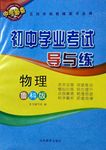题目内容
We ________ see any flowers ________ May in Canada.
[
]|
A .will; until |
B .won't; after |
|
C .won't; until |
D .will; before |

 七星图书口算速算天天练系列答案
七星图书口算速算天天练系列答案 初中学业考试导与练系列答案
初中学业考试导与练系列答案Your computer has been playing music for years, one CD at a time. Now hundreds of songs can be stored in your PC if they' re in the MP3 format (格式).
|
What is it? MP3 compressed(压缩) music into small computer files. You may download MP3 music several ways: Music can be downloaded from websites that have turned wide music libraries into MP3. Once MP3 music is on your PC’s hard drive, you can play it through your computer's speakers, "burn" it onto blank CDs or swap(交换) MP3 files with friends using e -mail. |
|
How much? Software needed to play and turn MP3 music is often free. Compact portable MP3 players start at around $ 40 and can hold hundreds of songs. A blank CD on which you can record music costs about a dollar. |
|
Advantages MP3 turns your home PC into a jukebox(自动唱机) . Small MP3 players are the size of a deck of cards(一副牌), making it easy to take hundreds of songs with you. |
|
Disadvantages You may find that some websites only allow you to listen but you can't download music. Others let you download music but can't be copied to MP3 players. And a growing number of new CDs make it impossible to copy songs to a computer. |
1.How can you get MP3 music?
A.By turning your home PC into a jukebox
B.By taking your own music or songs with you.
C.By copying songs to a PC through the speakers.
D.By downloading from websites, which have turned music libraries into MP3.
2.What is the closest meaning of the underlined word "burn"?
A.Copy. B.Play. C.Store. D.Change.
3.Which is NOT true according to the passage?
A.Software needed to play and convert MP3 music is often free.
B.MP3 music can be with friends by e-mail.
C.MP3 music can be downloaded for free at any site.
D.A greater number of new CDs make it possible to copy songs to a computer
4.How much will you pay for a compact portable MP3 player?
A.Free. B.At least 10 dollars. C.About forty dollars. D.About a dollar.
5.How many disadvantages of MP3 can we see from the passage?
A.2 B.3 C.4 D.5
